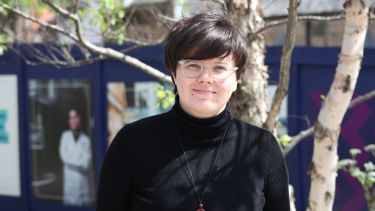I especially appreciated resources directed at international students, as I didn't have a lot of direct experience with the British university system
What brought you to Sheffield?
I actually had never set foot in Sheffield before starting this PhD! I came across this project through the White Rose College of the Arts and Humanities' Collaborative Doctoral Award (CDA) scheme, and I was immediately interested in the research questions it raised. I also liked that the project was a partnership with ZOO Digital, a company specialising in media localisation. The interviews with my future supervisors and members of the School cemented my impression that Sheffield would be a great place to study in, and I haven't been proven wrong! I appreciated that they showed an interest in my previous experiences and what these could bring to my approach to the PhD.
Why are you doing a PhD?
After completing my master's degree in Natural Language Processing in France, I started working in the private sector for a short while, and while I enjoyed it, I realised I missed having a more research-oriented perspective on industry issues. Working on a PhD project in partnership with an industry leader in media localisation feels like the best of both worlds, in a way: I get to delve deeper into my research questions while figuring out how they intersect with the industry perspective on translation and dubbing. Regardless of what you're planning to do after a PhD, I think it's a once-in-a-lifetime opportunity to develop research and thinking skills that are incredibly helpful just about anywhere.
What’s the focus of your research?
My research focuses on non-literal language features in machine and human translation for dubbing. Non-literal language (e.g. jokes, idioms, metaphors, etc.) is always a challenge to identify and translate, partly because it relies on various types of contextual knowledge. This is especially true when working in audiovisual translation and, more particularly, dubbing: pragmatic and context-dependent meanings often contribute to character or story development in films or TV series, and an 'awkward' translation affects the viewers' experience negatively. I'm hoping that insight into both machine translation systems and the human translation process can help me identify and formally describe the linguistic, textual and visual characteristics of non-literal language in film in order to provide better translations for them. To this end and in partnership with ZOO Digital, I'm preparing interviews with human dubbing translators as well as an observational study of translators' behaviours as they translate non-literal language features. This is a fascinating project to work on as it draws on many different research fields: film studies, translation studies, pragmatics, and natural language processing.
What’s it like being a postgraduate in the School of Languages & Cultures?
There is a nice balance of structure and flexibility for PGRs in the School, in my opinion. My supervisors offer me plenty of support and structure with regular supervision meetings and reminders about University requirements. I find these extremely helpful, as working on a PhD can sometimes feel lonely on a day-to-day basis. On the other hand, one of the best (and arguably hardest...) things about working on a PhD is having a flexible schedule and planning out your research goals, and I appreciate that my supervisors trust my ability to do that by myself. For example, I'm able to set my own working hours and holidays in order to balance my PhD work and my personal life, which I feel is necessary to succeed in the long run!
How did you find the first few months in particular?
Settling in another country for an extended period of time is always slightly nerve-racking, especially when dealing with visa issues and social distancing, so the first few months were actually a bit stressful! It really helped that the University and my supervisors were very helpful throughout the formal application process and with practical issues like moving and finding accommodation. Once I got to Sheffield, I found it to be a very welcoming environment for me to start my research in.
What resources are available to you?
The libraries are obviously a huge draw: they are wonderful buildings to study in when I want a change of scenery from the office, and they offer so many resources that I feel I've barely scratched the surface of. Having a desk in the PGR space at the School is also essential: it makes interacting with other PGRs and members of the School that much easier, and it helps me stay motivated as well.
What additional opportunities are there in the School?
There are plenty of training opportunities for PGRs at the University - so many, in fact, that deciding which ones to go for was probably the biggest challenge! I especially appreciated resources directed at international students, as I didn't have a lot of direct experience with the British university system before this PhD. Signing up for additional training helped me understand what the University requirements and deadlines to complete a PhD were, and how to get there. It's also always nice to hear about conferences and events going on at the School and find out what other people are working on! Even when they're not directly related to my research, it's always an enriching experience.

